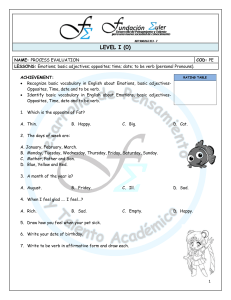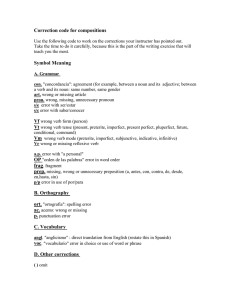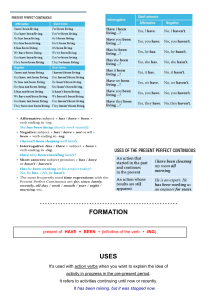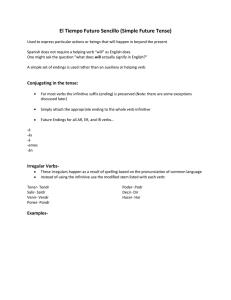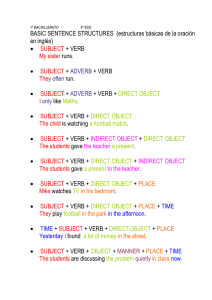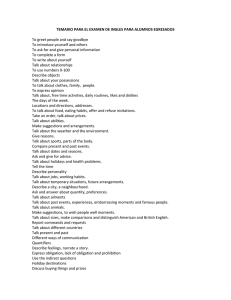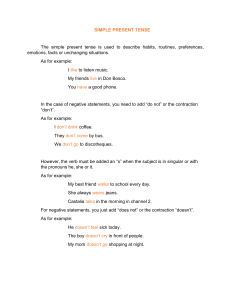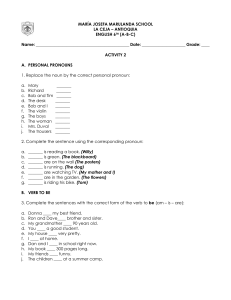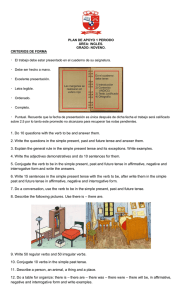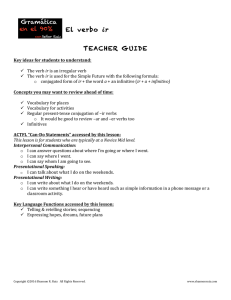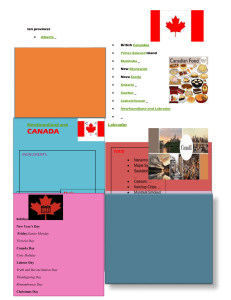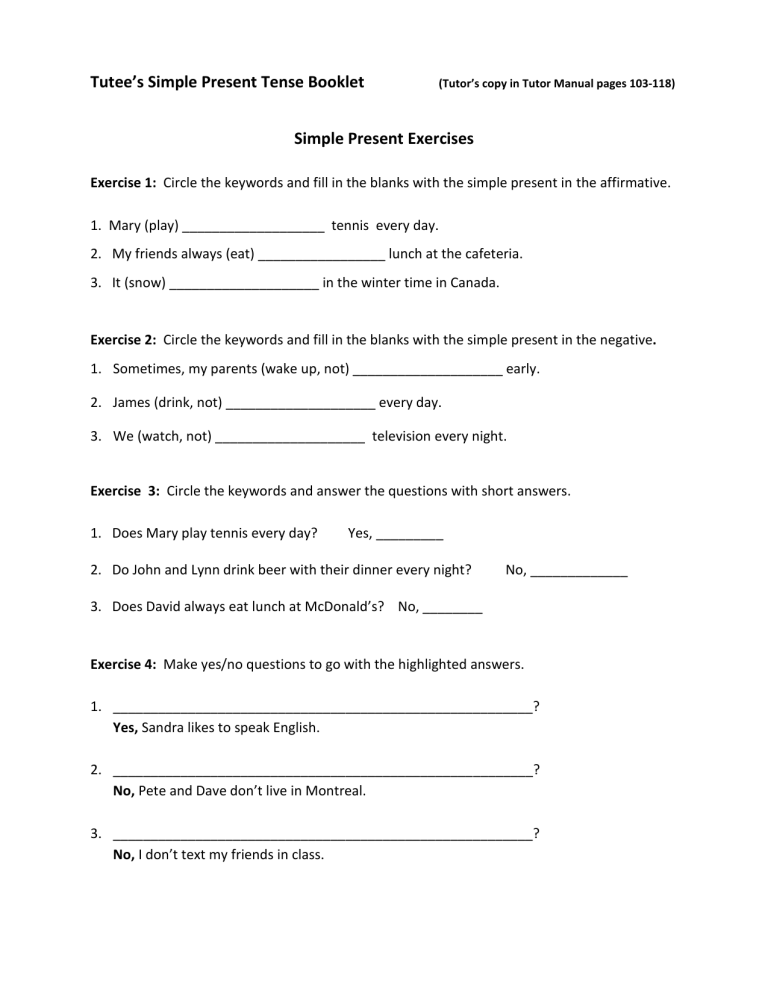
Tutee’s Simple Present Tense Booklet (Tutor’s copy in Tutor Manual pages 103-118) Simple Present Exercises Exercise 1: Circle the keywords and fill in the blanks with the simple present in the affirmative. 1. Mary (play) ___________________ tennis every day. 2. My friends always (eat) _________________ lunch at the cafeteria. 3. It (snow) ____________________ in the winter time in Canada. Exercise 2: Circle the keywords and fill in the blanks with the simple present in the negative. 1. Sometimes, my parents (wake up, not) ____________________ early. 2. James (drink, not) ____________________ every day. 3. We (watch, not) ____________________ television every night. Exercise 3: Circle the keywords and answer the questions with short answers. 1. Does Mary play tennis every day? Yes, _________ 2. Do John and Lynn drink beer with their dinner every night? No, _____________ 3. Does David always eat lunch at McDonald’s? No, ________ Exercise 4: Make yes/no questions to go with the highlighted answers. 1. ________________________________________________________? Yes, Sandra likes to speak English. 2. ________________________________________________________? No, Pete and Dave don’t live in Montreal. 3. ________________________________________________________? No, I don’t text my friends in class. Simple Present Picture Exercises wake up at 6:00 take a shower eat breakfast drive cook watch TV do your homework play the piano play video games read listen to music 2 Verb be Present Tense Exercise 1: Conjugate the verb be in the present tense. Affirmative Negative I ............. I ………… You …….……. You ………… Yes/No Question Short Answer .............. you .....…….? No, ………….. He/She/It ……….… He/She/It ………… .............. he ……........? No, ……….…. We …………. We .............. we ……........? Yes, …………… You …………. You ………… .............. you ......…….? Yes, …………… They …………. They ………… .............. they ........….? Yes, …………… ………… Exercise 2: Fill in the blanks with the correct form of the verb be in the affirmative in the present. 1. Peter (be) _________________ on the phone. 2. They (be) _________________ at home. 3. I (be) _________________ a student. Exercise 3: Fill in the blanks with the correct form of the verb be in the negative in the present. 4. We (be, not) _________________ 50. 5. You (be, not) _________________ Spanish. 6. She (be, not) _________________ on holiday. Exercise 4: Answer the questions with a short answer. 7. Are you from Montreal? _________ 8. Is your best friend female? _________ 9. Are your parents together? _________ 3 Exercise 5: Make yes/no questions to go with the answer in bold. 10. _____________________________________________? Yes, they are married. 11. _____________________________________________? No, she isn’t bored. 12. _____________________________________________? No, I am not friendly. Negative Regular and Verb be Verbs Exercise 1: Fill in the blanks with the correct form of the simple present. 1. I (be, not) ______________________ a teacher. 2. Jane (take, not) ______________________ the bus to school. 3. I (want, not) ______________________ to buy a new car. 4. My father (have not) __________________ a house in Montreal. 5. We (be, not) ________________________ in our psychology class. Simple Present Verb have Exercise 1: Conjugate the verb have in the simple present. I We You You He/She/It They Exercise 2: Fill in the blanks with the correct form of have in the simple present. 1. I ( have) _______________________________ a big nose. 2. He (have) _______________________________ long hair. 3. She (have) ______________________________ small feet. 4 Adverbs of Frequency and Irregular Simple Present Spelling Exercises ALWAYS USUALLY OFTEN SOMETIMES RARELY NEVER Exercise 5: Answer the questions. 1. What tense do you use with adverbs of frequency? ____________________ 2. Where does the adverb of frequency go with a regular verb? ____________________ 3. Where does the adverb of frequency go with the verb be? ____________________ Exercise 6: Fill in the blanks with the simple present and place the adverb of frequency correctly. 1. She (brush, always) ________________________ her teeth in the morning. 2. He (go, never) ______________________________ to sleep at eight o’clock. 3. Jane (be, usually) _______________________ at home in the evenings. 4. Dave (study, sometimes) ________ ________________ in the morning. Exercise 7: Ask your tutor the questions below and write her/his answers in the space provided. 1. How often do you go shopping on the weekend? My tutor __________________________ on the weekend. 2. How often do you drive to Montreal? My tutor __________________________ to Montreal. 3. How often do you fly to London? My tutor ___________________________ to London. 4. How often are you at school at 7:00 in the morning? M y tutor is ____________________________ at school in the morning. 5 Adverbs of Frequency Board Game Rules: 1. 2. Make a true sentence in the simple present about yourself or another person when you land on a square using a keyword (ever day, once a week, always, sometimes, never, etc. Ask your partner a “how often” question or about a person s/he knows using the vocabulary in the square. Examples: How often do you eat breakfast...? How often does your mother eat breakfast? How often are you early for class? start eat breakfast? go on Facebook? put on make up? take a bath? see your best friend? be hungry? watch the Simpsons in English? text your friends in class? do the laundry? miss a turn dye your hair? be early for class? go jogging? The winner! clean your bedroom? go to bed before 10 o’clock? watch English movies with subtitles? drive to school? cook for your family? take the bus to school? be late for class? cheat on tests? sleep in class? eat dinner with your parents go to your English class? shave your legs? play video games? eat pizza? text your mother? eat potato chips? drink coffee in the morning? brush your teeth at night? smoke cigarettes? put dishes in the dishwasher? wake up at 6:00 o’clock? listen to the radio in the morning? go to your classes? read an English magazine? go to the cinema? miss a turn drink beer? wear a dress? play hockey? 6 go to a restaurant see your grandmother? Introduction to Question Formation Yes/No and Information Questions Exercise 1: Underline the yes/no question and circle the information question. Then explain the reasons for your choices. Type of Question Reason a. Are you a CEGEP student? b. Where does he work? Regular and Be Questions Exercise 2: Underline the example of a regular question and circle the example of the be question. Then explain the reasons for your choices. Type of Question Reason a. Do you have a car? b. Where are you from? Exercise 3: Choose the correct answer about questions. 1. “Do you live in Montreal?” is a yes/no question because the answer is a. yes or no b. isn’t yes or no 2. “Where are you from?” is an information question because the answer is a. yes or no b. isn’t yes or no 3. “Where are you from?” is a be Questions because a. the main verb is the verb be. b. the main verb isn’t the verb be. 4. “Do you live in Montreal?” is a Regular Question because a. the main verb is the verb be. b. the main verb isn’t the verb be 7 Exercise 5: Indicate whether the question is a Yes/No Question or an Information Question and whether it is a Regular or Be Question and explain why. Then ask your tutor the questions. Question Yes/No Question (y/n) Regular Question (QASV..) Information Question (i) Be Question (Q be S..) 1. Are you 18 years old? 1. ___________ 1. ___________ 2. What is your favourite sport? 2. ___________ 2. ___________ 3. Where English TV shows do you watch? 3. ___________ 3. ___________ 4. What time is it? 4. ___________ 4. ___________ 5. Do you like speaking English? 5. ___________ 5. ___________ Question Formation Steps 1. 2. 3. 4. 5. What tense is it? Is it a yes/no question or an information question? Is it a regular question or be question? Form question. Check that the auxiliary agrees with the subject for regular questions or that the verb agrees with the subject for be questions. Exercise 6: Follow the question formation steps to make questions to go with the answers in bold. Tense Question Type Example simple yes/no present 1. 2. 3. Question Question Form regular Agreement Where do they work They work at a hospital ? ______________________________________? John sells cars. ______________________________________? Yes, I am a nurse. ______________________________________? My friends love their English class. 8 yes
